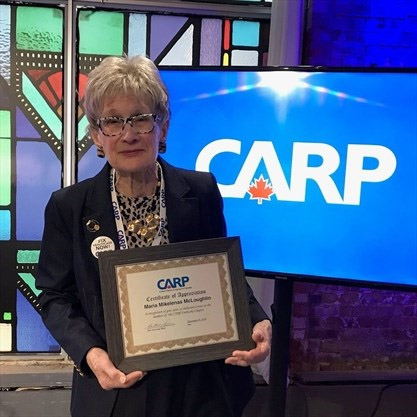
Good Advice – and an Excellent Example
Maria Mikelenas-Mcloughlin is known in the Lithuanian Community as a frequent participant and supporter of Lithuanian activities. Formerly Customer Service Coordinator of the Management Board Secretariat of Ontario, she is still active in her retirement – formerly president of the Etobicoke Chapter of CARP, and member of several groups, she writes on Toronto.com that she hopes her “community engagement” will help to keep seniors safe. Toronto senior’s advocacy started with her late husband — and then for herself. This is what she said:
I live alone in one of the small old bungalows in central Etobicoke. My family live in other parts of Ontario. I’m a widow with no children, well over 70 years old, who has a severe chronic illness and a compromised immune system. A few years ago, I had spinal surgery and now have mobility issues, resulting in my walking with a brace and using a cane.
I had a preview of what isolation felt like at that time, as I was housebound for four months. The difference from what we’re experiencing now is that visitors could enter my home and I did receive some care.
I joined the Etobicoke Chapter of CARP six years ago when it was first formed. It appealed to me because I had become an advocate for my late husband when he became very ill, and was in and out of hospitals for several years. I needed to learn how to navigate the health system — not an easy task. When I had my life-saving surgery, it became imperative to advocate for myself. I received advice from the chapter president, who asked me to join the board. Advocating for seniors is important. We are not invisible.
Over the last few years, I was able to get involved with associations and continue my community engagement. You may ask “How has this helped you to cope during the pandemic?” I stay socially connected via phone calls with other seniors, sharing information, giving a listening ear while drinking endless cups of tea (a senior’s favourite beverage) and lots of emails. I find time to laugh over video conference and share music on YouTube with my peers.
Being active in community has been rewarding. Parents of children who go to school nearby often park their cars in front of my home. I talk to them and their children when I’m in the front yard. Recently, two of the mothers separately came to my door and then stood on the sidewalk, asking what help I needed during my isolation — a delightful surprise. I’ve talked to dog walkers from the neighbourhood. Surprise packages have been left at the door, and cellphone numbers to call dropped through my mail slot by my dear neighbours. All of this reassures me that I’ll be OK. Their reaching out is a sign that we belong to a real community. I’m grateful for the unsolicited outreach.
Health professionals have advised my demographic to stay active, both mentally and physically. I’ve been participating in webinars with organizations like the Ontario Securities Commission on topics like fraud prevention for seniors, CARP interactive town halls on finance and health issues during this pandemic and other internet activities such as church services and planning future travel.
Getting gardens ready has been providing exercise, and with better weather I will be able to distance myself when I use my poles to go around the block. I continue to share information with my networks and they, in turn, do the same. A sense of contributing and belonging is vital during times of stress.
In order to stay relevant, we seniors have to continue to advocate for ourselves and take a chance on something new. An intergenerational approach is most beneficial, even if it’s virtual. I’ve learned to mix up my timetable in order to keep the brain neurons active. For example, instead of washing clothes on Saturday, I now benefit from the hydro rates being changed, and wash on Tuesday.
Resilience comes from community. Get “out there” — even if you’re indoors in front of your laptop — and make some connections. And, if you’re a senior like me, consider joining CARP and your local chapter. The friendships you make will last when COVID-19 is a distant memory.
This article appeared in the Opinion section of Toronto.com on April 26, 2020.



























